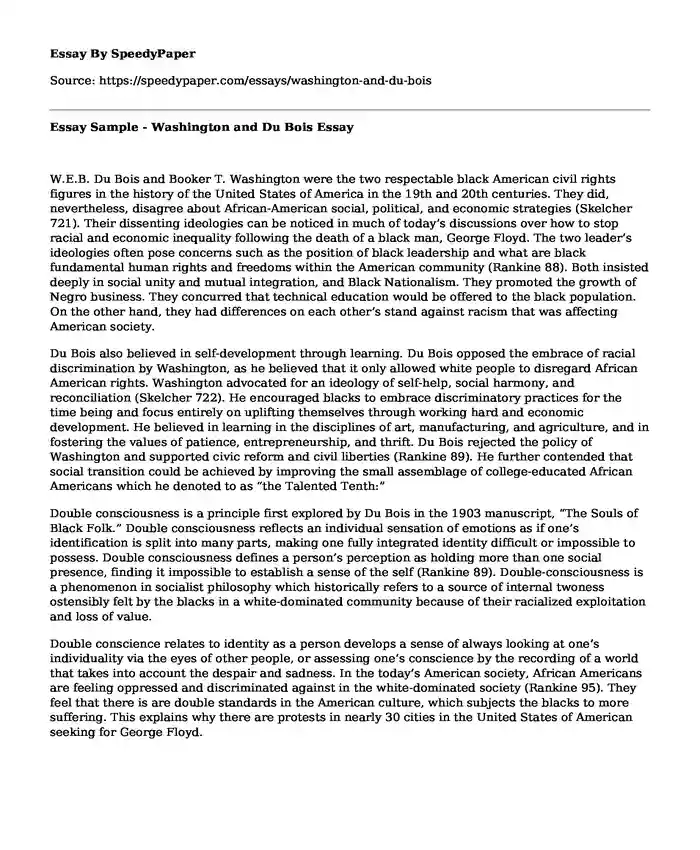
| Type of paper: | Essay |
| Categories: | Race Discrimination Civil rights Historical & political figures |
| Pages: | 2 |
| Wordcount: | 525 words |
W.E.B. Du Bois and Booker T. Washington were the two respectable black American civil rights figures in the history of the United States of America in the 19th and 20th centuries. They did, nevertheless, disagree about African-American social, political, and economic strategies (Skelcher 721). Their dissenting ideologies can be noticed in much of today’s discussions over how to stop racial and economic inequality following the death of a black man, George Floyd. The two leader’s ideologies often pose concerns such as the position of black leadership and what are black fundamental human rights and freedoms within the American community (Rankine 88). Both insisted deeply in social unity and mutual integration, and Black Nationalism. They promoted the growth of Negro business. They concurred that technical education would be offered to the black population. On the other hand, they had differences on each other’s stand against racism that was affecting American society.
Du Bois also believed in self-development through learning. Du Bois opposed the embrace of racial discrimination by Washington, as he believed that it only allowed white people to disregard African American rights. Washington advocated for an ideology of self-help, social harmony, and reconciliation (Skelcher 722). He encouraged blacks to embrace discriminatory practices for the time being and focus entirely on uplifting themselves through working hard and economic development. He believed in learning in the disciplines of art, manufacturing, and agriculture, and in fostering the values of patience, entrepreneurship, and thrift. Du Bois rejected the policy of Washington and supported civic reform and civil liberties (Rankine 89). He further contended that social transition could be achieved by improving the small assemblage of college-educated African Americans which he denoted to as “the Talented Tenth:”
Double consciousness is a principle first explored by Du Bois in the 1903 manuscript, “The Souls of Black Folk.” Double consciousness reflects an individual sensation of emotions as if one’s identification is split into many parts, making one fully integrated identity difficult or impossible to possess. Double consciousness defines a person’s perception as holding more than one social presence, finding it impossible to establish a sense of the self (Rankine 89). Double-consciousness is a phenomenon in socialist philosophy which historically refers to a source of internal twoness ostensibly felt by the blacks in a white-dominated community because of their racialized exploitation and loss of value.
Double conscience relates to identity as a person develops a sense of always looking at one’s individuality via the eyes of other people, or assessing one’s conscience by the recording of a world that takes into account the despair and sadness. In the today’s American society, African Americans are feeling oppressed and discriminated against in the white-dominated society (Rankine 95). They feel that there is are double standards in the American culture, which subjects the blacks to more suffering. This explains why there are protests in nearly 30 cities in the United States of American seeking for George Floyd.
Works Cited
Rankine, Patrice. "Afterlife: Du Bois, Classical Humanism and the Matter of Black Lives." International Journal of the Classical Tradition 26.1 (2019): 86-96.
Skelcher, Bradley. "Between Washington and DuBois: The Racial Politics of James Edward Shepard." (2018): 721-722.
Cite this page
Essay Sample - Washington and Du Bois. (2023, Aug 23). Retrieved from https://speedypaper.com/essays/washington-and-du-bois
Request Removal
If you are the original author of this essay and no longer wish to have it published on the SpeedyPaper website, please click below to request its removal:
- Cold War - Free Writing Assignment Example
- Summary of the Prince Book - Essay Sample
- Essay Sample on Martin Luther King Jr's Letter from Birmingham Jail
- "Nothing but a Man" Essay Sample
- Essay Sample. How Upper-Class Roman Women Exercised Autonomy
- Free Essay Example: Feminine Mystique and the Second Wave Movements
- Free Essay Sample on Workplace Inclusivity
Popular categories




